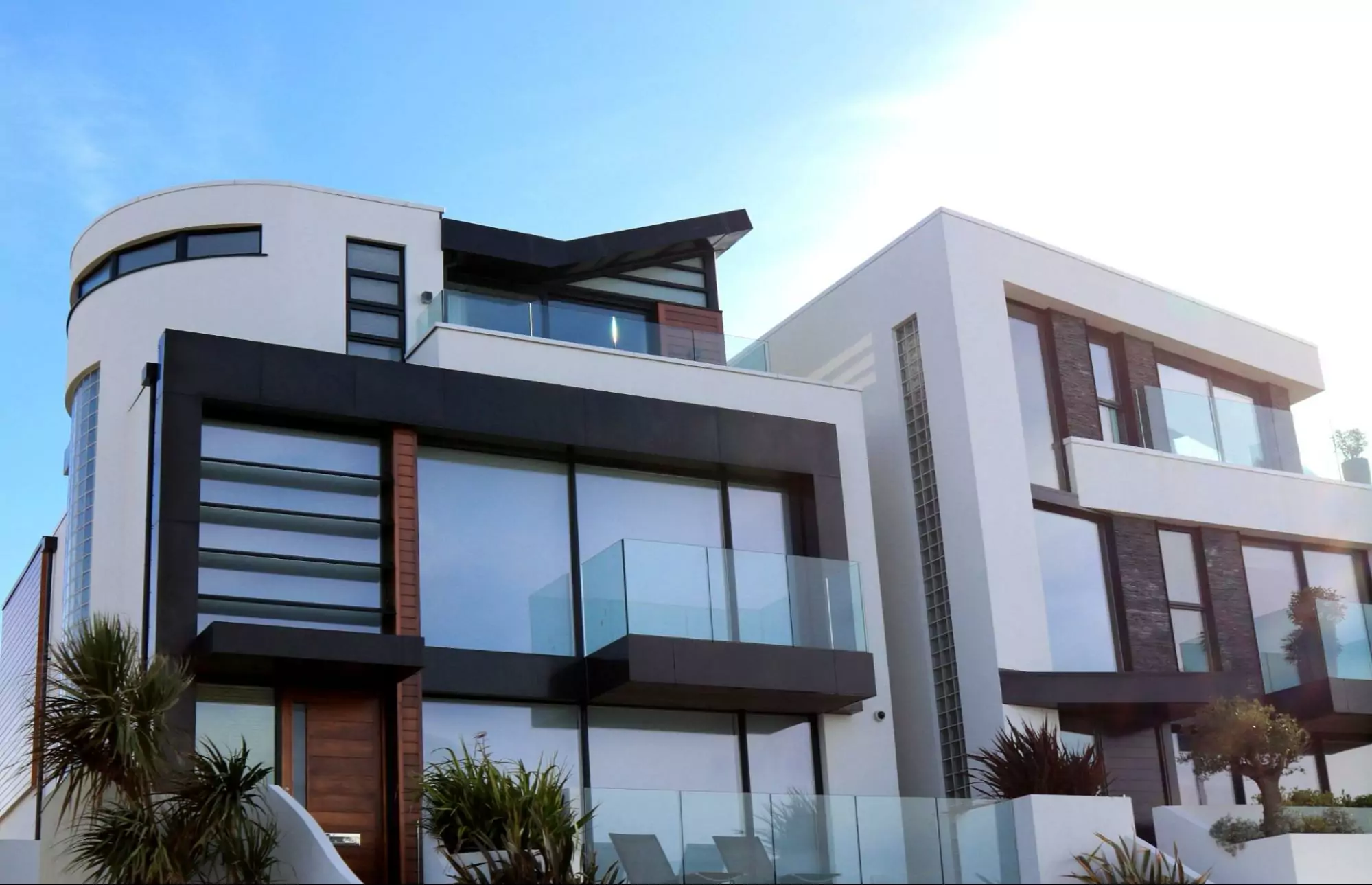If you want to diversify your investment portfolio past the standard stocks, bonds, and mutual funds, real estate is a great investment option. But, if you do want to start investing in real estate, how can you get started?
In this article, we’ll cover how to start investing in real estate.
1. A Beginner’s Guide to Investing in Real Estate
Contrary to popular belief, you don’t need to do very much if you want to get started investing in real estate. In fact, you don’t even have to buy property. All you need is a discount brokerage app where you can invest in a Real Estate Investment Trust (REIT).
REITs are companies that manage real estate properties that turn a profit, such as shopping malls, office buildings, and hotels, to name a few.
For investors, the important thing to note is REITs package 90 percent of their profits into monthly dividends, so you get a nice check every month from the proceeds without any of the property management or landlord responsibilities one would expect from a real estate investment.
Even if you want to own a property, you don’t necessarily have to be the one to put up the cash, a partner could be the one to put up the money for purchasing and expenses while you self-manage the property and look for tenants.
Of course, you could also be the one to provide the money and you don’t have to worry about managing the property in any way because there are plenty of property management companies out there to do it for you. This will allow you to earn passive income without an active role in managing the property.
It may seem like you need a large down payment to purchase a property and get started investing in real estate, but all you need is a strong network of like-minded friends, family, or professional real estate investors that can contribute the capital or join a developer’s crowdfunding initiative. Some of these initiatives include companies such as CrowdStreet, Fundrise, PeerStreet, and RealtyMogul.
Investing in real estate is easier than you think. However, if you need more than the possible first steps, read our Ultimate Guide to Real Estate Investing.
2. Is Real Estate a Good Investment?
Real estate can be a good investment for many reasons. It offers strong leverage, you can use equity proceeds or other people’s money, like a bank or investor, to expand your portfolio. To manage your growing finances effectively, tools like checking account dividers can help keep property-related funds clearly separated and organized.
Stocks and bonds don’t have this ability.
Real estate is also a good investment because of its potential for appreciation. Historically, property values rise with inflation over time, unlike other investments like cars, which start depreciating as soon as you drive them off the lot.
However, whether your property appreciates has a lot to do whether it’s in an area with growth potential.
You’ll also receive many tax benefits as a property owner, including several ways to reduce or outright avoid capital gains tax when selling a property at a profit. For more information on that, read our Tax Guide for Buying and Selling Real Estate 2021.
Meanwhile, as soon as your property has tenants in it, you’ll receive rent checks every month as your primary form of passive income. The best-case scenario is you turn a profit after expenses and generate a positive cash flow in the near term.
Thankfully, Baselane’s analytics platform can help you maximize the amount of that income you do receive by helping manage your expenses, profits, and the way you collect that income in the first place while helping you understand your property to the point where you can get more of that income.
Of course, real estate also has its drawbacks, but is it a good investment? Yes, especially if you’re looking for stable, consistent, and eventually rising returns you can use pretty much immediately.
3. How Much Do You Need to Invest in Real Estate?
You don’t need a lot of money to invest in real estate. Even if you were to buy and hold property in the conventional rental property sense, on average you’d only need as much as 20% down.
If you have bad credit and are seen as a risky borrower, you will have to put more money down, but some have been able to buy a property for as little as 3% of the sale price. This is particularly true if you buy a distressed property for a future renovation so you can eventually sell it as a profit.
If you’re wondering what the basic eligibility requirements for investment property financing from most lenders are, the most recent Fannie Mae Eligibility Matrix is a decent starting point.
The Fannie Mae Eligibility Matrix for Investment Property Financing
The Fannie Mae Eligibility Matrix is used by lenders evaluating potential buyers for financing for an investment property. The eligibility factors it takes into account for a mortgage loan are pretty standard. They include your credit score, your minimum reserve requirements, your debt-to-income (DTI) ratio, and your loan-to-value (LTV) ratio.
Below is what the Fannie Mae Eligibility Matrix requires in terms of down payment and maximum LTV ratio based on the number of rental units in the property:
| Units | Maximum LTV | Down Payment |
| 1 | 85% | 15% |
| 2-4 | 75% | 25% |
Freddie Mac’s Investment Property Mortgages
Another option available specifically for investment property financing are the investment property mortgages backed by Freddie Mac. The LTV ratios and down payment percentages Freddie Mac requires for an investment property loan are similar to those of Fannie Mae:
| Units | Maximum LTV | Down Payment |
| 1 | 85% | 15% |
| 2-4 | 70% | 30% |
Beyond financing for an actual rental property, you can also invest in real estate through a crowdfunded real estate project. However, it may cost you $150,000 to $250,000 for a minimum investment on a commercial real estate platform like CrowdStreet. Thankfully, some residential real estate crowdfunding platforms are operating at a lower threshold. For example, you can get in at $5,000 on RealtyMogul or as little as $10 in some cases on sites like Fundrise. However, you will have to pay a standard upfront fee that ranges from 1%-2.5% if you use these platforms.
If you’re investing in a REIT, a publicly-traded REIT may only cost a few dollars or $1,000 to $2,500 per share.
Private REITs that aren’t publicly traded are much more expensive. A minimum investment of $10,000 isn’t uncommon.
For more on REITs, crowdfunding residential or commercial real estate, buying and holding a rental property and other real estate investment strategies, read our ‘The Ultimate Guide to Real Estate Investing in 2021.
4. Where Should You Invest in Real Estate?
When investing in real estate, you’ll want to choose a place with a historically high return on investment. As a new investor, you may start by looking at large and well known cities , but smaller towns and areas can offer an equally high ROI.
To ensure your investment is profitable, you should consider the following factors:
- Population, Economic and Job growth trends
- Property values and growth trends
- Areas where a large percentage of the population is renting vs owning
- Attractive Rental rates (average or median) relative to property values
- High rental occupancy rates
- Low rental default rates (could vary in each city based on several factors including average income, job market, etc.)
- Other – several factors that could make a city or town attractive for renters (safety, education quality, quality of life, affordability, etc.)
Start by assessing the above factors in the area you’re targeting. After that assess the vacancy rates in the neighborhoods and towns you plan to target. By doing this, you can estimate how easy it will be to keep all your rental units occupied.
Then calculate the number of rentals you need to fill in a given property relative to your mortgage payments. This will tell you the minimum number of units you need to rent in order to turn a profit.
See the example below:
- You purchase a 4 unit property for $450,000, make a downpayment for $90K (20%) and get a loan for $360,000 at 4%.
- Your monthly mortgage payment will be $2,319 (principal and interest, taxes and insurance)
- If you generate $850/unit, you would need to rent 3 of the 4 units to cover your costs
- To be safe, target areas with vacancy rates <5%
Finally, you want a neighborhood with a low tenant default rate, as there’s nothing worse than losing out on rental income.
Some of the best cities to invest in real estate and the top reasons to invest there are below:
Boise
- Population 200K (700K in the wider Boise metropolitan area)
- Rapid population and job growth (2-3x national average)
- Median property price is $499,000 (up 27.95%)
- 1-year appreciation forecast of 15-20% (Boise Metro).
- Despite high appreciation, home values are expected to hold as market demand appears to be strong.
- Rents are rising (median monthly rent is $1,410)
- Low rental vacancy rates: ~3.5%
Atlanta
- Population 0.5M (grew ~10% since 2010, expected to reach 2M by 2030)
- Atlanta has a growing economy that is 8th in the nation for GDP and is home to a wide variety of businesses that includes Fortune 500 companies.
- Cost of living is 60% less than Manhattan
- Median home price is $359,000 (starting at $70K)
- Rents are rising (median monthly rent is $1,706)
- 50% rent vs 50% own
- Atlanta is one of the Top Rental Markets in the U.S.
Las Vegas
- Population 2.7M (grew ~3% since 2019)
- Very low investment property taxes (0.7%). No income tax
- Median home price is $389,465
- Rents are rising (~3% last year) (median rental per month is $1,200)
- ~50% of the city’s population are renters
- Low supply of available rental housing. It’s currently one of the hottest rental markets in the U.S.
Houston
- Population 2.3M (grew ~10% in the last decade, 4th largest city in the U.S.)
- Houston is the #1 Market in the US for Job Creation.
- 1-year appreciation forecast of 10-15% (Houston Metro)
- Median home price is $305,000
- 5%-20% below the current fair market value.
- Rents rose 6% last year (median rental per month: $1,550)
52% rent vs 48% own
Dallas
- Population 1.2M (grew ~10% during pandemic, expected to double in Next 15 Years)
- Dallas is one of the leaders in the U.S. for employment and population growth.
- Properties 5% – 15% below market value. 3-year appreciation forecast of 10-15%.
- Median home price is $310,000
- Rents are on the rise (median monthly rent is $1,345)
- 52.9% of Dallas rents vs. 33% nationally.
Orlando
- Population of 2.5M (grew 2.5% over 2021, ranked #2 in Forbes fastest growing cities in the U.S.)
- Strong economic and job growth.
- Lots of inbound migration from high cost of living areas in California and other parts of Florida.
- Over 70 million tourists each year (good for short-term rentals)
- Median home price is $260,000
- Rents rose 2% in 2021 (median monthly rent is $1,599)
- >60% of the population rents
Chicago
- Population of (2.7M) – third largest city in the U.S.
- High affordability and Solid blue-collar areas with high rents
- Low cost of living
- Median home price in the Chicago Primary Metropolitan Statistical Area is $269,900
- On the UBS list of America’s richest cities
- Often ranked for having America’s most balanced economy
- Rents are rising (median monthly rent is $1,761)
- 50% rent vs 50% own
Austin
- Population of 961K (grew 20% in the last decade)
- Economic growth far exceeds the national average and high job growth (11th most populated city in the U.S.)
- Low cost of living compared to the rest of Texas
- No state income tax
- Median home price is $405,093
- Investments properties can range from $200K – $500K
- Rents are on the rise (median monthly rent is $1,750)
- 48% rent vs 52% own
- Austin has a record of being one of the best long-term real estate investments in the U.S. over the past 10 years.
Spokane
- Population of 213K
- Median Home price is $389,728 (up 19% year over year)
- Home prices expected to rise at a steady pace from 2021-2022
- Current inventory sits for an average of 19 days on the market, favoring sellers (down 10.3% compared to last year)
- Rents are increasing (median monthly rent is $1,295)
- 43% rent vs 56% own
Spokane has a record of being one of the best long-term real estate investments in the U.S. over the past 10 years
5. How to Invest in Real Estate with a Small Amount of Money
There are several ways to invest in real estate with very little money down.
- Crowdfunding: Using sites like RealtyMogul, Fundrise, and CrowdStreet
- Wholesaling: Arranging a purchase of a distressed property by finding a buyer for the seller
- Property Flip: Buying a distressed property, renovating it, and selling it for a profit
- Partnership or Joint Venture: Where the capital responsibility falls on your chosen partner and you manage the property or vice versa
- Turnkey Rental: Ready-made rentals that may already have tenants
- Distressed Rentals (sometimes referred to as BRRR method): Rentals that require the landlord to do significant repairs ranging from cosmetic to full-gut renovations before renting out the property
- REIT: Real Estate Investment Trust
For more information on all these proven investment strategies see ‘The Ultimate Guide to Real Estate Investing in 2021.
FAQs About Real Estate Investing
Real estate is generally a stable, low-risk investment with consistent returns, but it can be a high-risk investment for you if you don’t do a few things.
If you’re not diligent and you don’t pay attention to what changes in your property and the real estate market, you are upping your risk considerably.
If you aren’t a good property manager or you don’t hire a good property manager, you aren’t managing your asset effectively and this makes your risk much higher.
Plus, you have to be careful not to over-leverage and make sure you can afford your payments. Being over-leveraged is a good way to become bankrupt. Meanwhile, if you don’t have a strong income going in, real estate investment may be a bit of a struggle for you and increase your risk, especially if you’re doing it alone.
Finally, without at least a $100,000 cushion, a buy and hold would be a high-risk strategy for you since things always can go wrong in real estate and you will need money on hand to solve the problem.
Though real estate generally does go up in value over the long term, several things need to be in place for that to happen.
Your property needs to be in a desirable location where housing inventory is low and growth is high.
Additionally, if interest rates are at historical lows, these buyers can more easily access financing to buy your property, which brings more buyers to the market and drives prices up.
If those factors are reversed, where there are plenty of places to live, but there’s no money available, or interest rates are high enough to make borrowing expensive, while there’s also no demand to live in your location, then the value of your property and the surrounding real estate is likely to drop.
The real estate market is almost completely without volatility. It is one of the most stable investments you can make.
Still, that doesn’t mean it can’t be volatile under certain circumstances. If there is volatility, the market may be in crisis or there may be panic demand related to an insecure political environment or maybe the developer of the building you invested in is losing money and their prices specifically are dropping.
If the real estate market you’re in is experiencing volatility, this is a red flag and is a big warning not to invest until things are more stable because the real estate market, in general, is rarely volatile.







